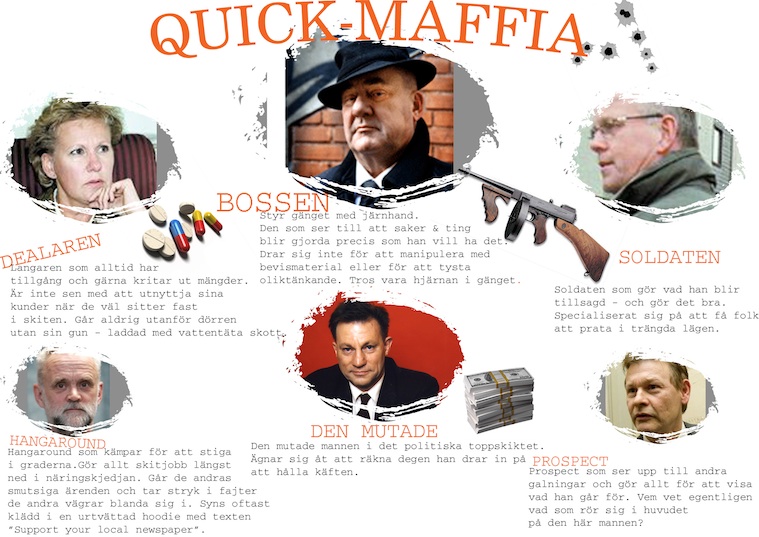Home » Industry Watch
The Quick Mafia Power PlayTruth, ethics, honesty: all out the window in the name of career. By America Vera-Zavala.
Now I too have read Dan Josefsson's book on Thomas Quick, The Man Who Stopped Lying. And I've got only one thing to tell the rest of you: read it!
Had this been a novel, I'd have thought the author's imagination was a wee bit too vivid. Had this been a movie, I'd have thought the screenplay was utterly brilliant.
But this is a true story about a cult who ensnared a mentally disabled man and got him convicted of eight murders that he didn't commit.
Yes a cult - a cult of prosecutors, doctors, psychologists, lawyers, and academics. And when you read the book, you end up asking yourself over and over again: do we have other cases like this in Sweden we've not yet discovered?
Dan Josefsson's book takes up where Hannes Råstam's book left off. Now it's no longer just about how the Swedish judicial system collapsed when Thomas Quick was convicted of murder after murder with no evidence whatsoever, but also about why. How could a drugged out patient in a psychiatric institution convince so many people that he'd traveled throughout Sweden and Scandinavia and killed everyone he encountered? What ideas supported such convictions? What kind of therapy were they really offering at that clinic anyway?
Reading the book is like immersing oneself in an episode of The Wire but in the environment of a mental hospital. After a while, you no longer have a clue who is fooling who, who's the criminal and who's the police, who's the patient and who's the psychologist, the defence attorney, the prosecutor. The only thing they have in common is their worship of the same individual: psychoanalyst Margit Norell and her ideas that the murders of Quick/Bergwall were a type of recreation of childhood abuse which he gradually can remember, thanks to kid glove treatment at the hospital.
What interests me most about the book is not how the 'therapy' ultimately became a sort of trance for everyone involved. What interests me most is how the power play around Quick made it all possible.
The main characters of The Wire are always vacillating between the ethical and personal ambition. And the higher up they go, the weaker their impulse to do the right thing.
In the Quick scandal we have lawyers, police, prosecutors, psychologists, doctors, and journalists stuck in the same dilemma. What is important there? Is it your mandate from the public or is it your career? Many of them probably started with good intentions, the idea - the thrill - of revealing a real serial killer.
But they must have understood as things dragged on that the case was a castle in the air. A few of those involved chose to jump ship and go public with their objections, but others saw that the fake serial killer was a ticket to the top of the social ladder, something they found they couldn't resist.
And every time Quick was convicted of another murder he didn't commit, they climbed a bit higher. The lecturer became a professor, the district attorney became a chief prosecutor, the psychologist became a chief therapist. But the real culprits, those who really committed those bestial murders? They got away.
The statute of limitations came into effect. But that was of lesser importance to the career climbers. They sought more power at all costs.
[Sture Bergwall is Thomas Quick's real name. It was Bergwall's psychologist Birgitta Ståhle who suggested Bergwall take on another name as news of the case reached the media, this to protect Bergwall's family - and this despite the 'Quick mafia' as they're called - the police, prosecutors, lawyers, and such - doing all they could to lay a lot of blame on Bergwall's family. Bergwall has since retaken his real name. The name Quick is often used even today as that's the name found in official documents from that time. Ed.]
Postscript: The Quick Mafia

The 'Quick mafia' as portrayed in the Swedish media: the Dealer: Birgitta Ståhle, Quick's 'therapist', who kept him senselessly drugged for years at levels of intoxication today illegal; the Boss: Krister van der Kwast, the luckless prosecutor who ran the entire show; the Soldier: police inspector Seppo Pentinnen who fed Quick leading questions so the latter could figure out the answers on his own; the Hangaround: the clumsy journalist who turned his work over to Hannes Råstam, thereof the unraveling we have today; the Prospect: 'expert' Sven-Åke Christianson who regards the cult leader Margit Norell as the 'mother I never had', and who used mumbo-jumbo to legitimise the whole circus for the courts; and the Bribed: infamous attorney Claes Borgström, known from the scandal of the Assange case, described here as the man from the top levels of politics that the others needed to push their own agenda, someone who effectively did nothing but count the staggering amount of cash that came his way (close to $1 million) by simply keeping his mouth shut.
The Quick case is generally regarded as the biggest judicial scandal in Swedish history, up to but perhaps not including the case of Julian Assange.
See Also
Learning Curve: The Quick Connection
|